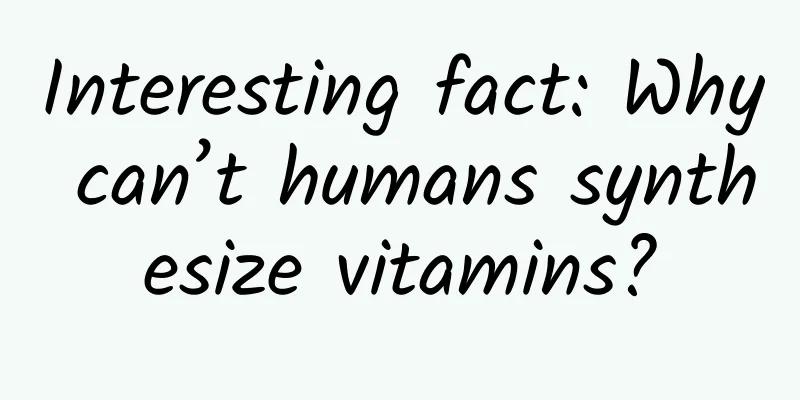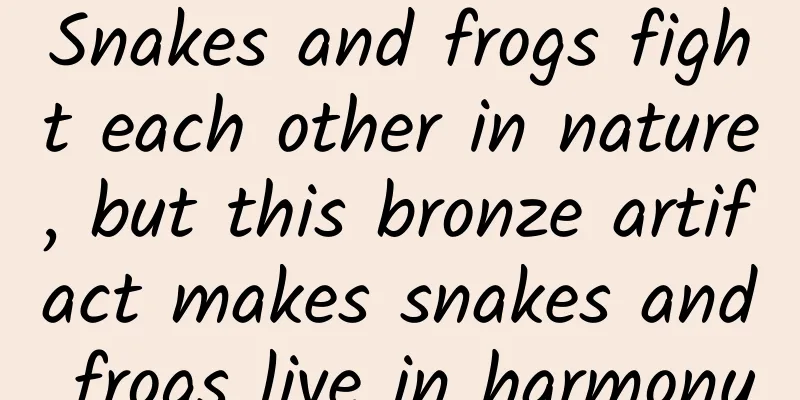Interesting fact: Why can’t humans synthesize vitamins?

|
Anyone who knows a little about biology knows that humans have a serious mutation in the gene for making vitamin C (gene for L-gulonolactone oxidase GULO), which makes it impossible to synthesize the protein GULO enzyme and thus make vitamin C. Many netizens are puzzled. Isn't vitamin C very important to humans? Why didn't such an important function evolve? In fact, the answer is very simple: because throwing away this thing is beneficial to our adaptation. And not only humans, but other animals also have the phenomenon of being unable to synthesize vitamin C. Today, let’s start with the function of synthesizing vitamin C and talk to you. 01. Which animals cannot synthesize vitamin C? I will first list three pieces of evidence. Due to the lack of evolutionary analysis of this gene in humans, I found a study on Chiroptera that demonstrated selection rather than randomness. Bats cannot synthesize vitamin C either 1. Chiroptera lost the ability to synthesize vitamin C at the same time as primates . Chiroptera 3 million years ago, and primates 58 million years ago 2. Many species appear, which does not seem to be a random event Currently, passerine birds and guinea pigs have shown an inability to synthesize vitamin C. 3. The gene inactivation process is a pseudogenesis and presents selection pressure . 02. When did humans lose this synthetic gene? We were originally able to synthesize vitamins, but this was selected out during our evolution. So when did we lose this synthetic gene? The answer is the time when the dinosaurs became extinct. This is a comparison of our close relatives. The time when LGO, a key enzyme in the synthesis of vitamin C, becomes ineffective is shown in the figure below. About 63–60 million years ago, early primates differentiated into two major groups: the Haplorrhini and the Strepsirhini.[1] The former is our direct ancestor, and the characteristic is that the upper lip is not directly connected to the nose, so it can make a lot of facial expressions, haha The other type is like this Soon, the former lost the ability to synthesize vitamin C, while the latter retained it. Of course, the earliest group to lose vitamin C synthesis, the Simplorhinus, differentiated 58 million years ago, which means that our ability to synthesize vitamin C was 63-58 million years ago [2]. Is this a coincidence? 03. It’s not a coincidence! If only a certain group of people lacks the ability to synthesize vitamin C, we can use explanations such as random drift and founder effects. For a large group of organisms, the lack of vitamin C can be explained by chance. Whether you believe it or not, I don’t believe it!!! In fact, the time point that I have shown you repeatedly before is the most critical time point . Most people know that about 65 million years ago, a super disaster occurred on Earth. Some say it was an asteroid hitting the Earth, some say it was a volcanic eruption, and some say it was a dinosaur fart. Anyway, there is only one ending, most of the dinosaurs (except chickens) became extinct. The biggest benefit of the extinction of dinosaurs is that the dark cloud hanging over the heads of mammals has completely disappeared. You know, contrary to what most people think, every major change in life on Earth is not the result of evolution, but the result of changes in the Earth. Under the power of heaven and earth, life is actually very small , so evolution has only made a small contribution. If there had not been the Ordovician mass extinction, the rulers of the Cambrian period would have been the kings of the earth, and reptiles would not have been able to rule the earth at all; If there had been no Cretaceous extinction event, dinosaurs that had survived for 160 million years would still be roaming the Earth, while mammals would always have been hiding in dark corners. Mammals have been silent for more than 200 million years since they appeared on Earth and took over the Earth's dominant stage. We have been trembling with fear and trying to survive between the Earth's dominant dinosaurs, walking on thin ice and facing the abyss. Until one day, the Earth gave us a chance. The mammals that were only the size of mice in the dinosaur era eventually grew into humans and became one of the masters of the earth. When the dinosaurs became extinct, mammals gained a second spring in life. After 200 million years of accumulation, mammals began to explode. And when there is a big outbreak, it brings us opportunities. 04. Evolution is not accidental In fact, although there are many random events in evolution, **selection is also very important after mutation. **If we lose the ability to synthesize vitamin C, which makes it unfavorable for us to survive, we will inevitably be eliminated, leaving only monkeys that can synthesize vitamin C. So what is the significance of the loss of vitamin C? 1. Being replaced, reducing consumption One point that is particularly noteworthy is that primates lost the ability to synthesize vitamins at the same time as they lost the ability to break down uric acid [3,4]. If you go to the hospital for a physical examination, you will know that there is a uric acid index. This substance cannot be decomposed by the human body. Frequent consumption of seafood and meat or drinking less water will lead to high uric acid! Uric acid is a very important strong reducing agent, which can play the role of some vitamins. The time when the human uricase gene is inactivated is roughly the same as the inactivation of vitamin C. What are the benefits? Uric acid is a metabolite, while vitamin C is a synthetic product. If a metabolite can replace a synthetic product, then why would the human body choose to synthesize it? For higher primates, the loss of gulonolactone oxidase and uricase played a driving role in helping early primates adapt to the changing environment, protect the body from cancer and prolong lifespan. 2. Promote evolution after stabilization. Please pay attention to the three words "after stabilization". One of the important functions of vitamin C is anti-oxidation. When primates went through the initial difficult times, the lack of vitamin C greatly accelerated the differentiation of primates. Due to the relative reduction of antioxidants, the oxidative free radicals in the body increased, so gene mutations became more active, and finally promoted the emergence of ancient humans from primates [5,6]. As for what happens if primates lack vitamin C? They eat it, because there is plenty of vitamin C in nature. What happens if they can't eat it? They die, so sailing was not easy in the past. Evolution is so cruel. One of the advantages of humans being omnivorous is that it has expanded our diet, so that we are not as affected by the food chain as some other creatures that are too single-skinned. That is why giant pandas eat bamboo and live in the mountains, while humans can live in the Sahara Desert, the Qinghai-Tibet Plateau, and the Arctic, not to mention the vast plains. Our body does not have to do everything and synthesize everything by itself . For example, we do not need to synthesize essential amino acids , which is much more important than VC. If we spend a lot of effort and energy on synthesizing these things, then human beings can forget about reaching for the moon or catching turtles in the oceans. This is evolution. Evolution is never about perfection, but about the most beneficial inheritance. Every organism has its own strategy. Just like humans cannot photosynthesize, this is itself the result of a choice. Finally, talking about evolution without talking about selection is just being a hooligan! ref. [1]Pollock JI, Mullin R J. Vitamin C biosynthesis in prosimians: evidence for the anthropoid affinity of Tarsius[J]. American journal of physical anthropology, 1987, 73(1): 65-70. [2]Goodman M, Porter CA, Czelusniak J, et al. Toward a phylogenetic classification of primates based on DNA evidence complemented by fossil evidence[J]. Molecular phylogenetics and evolution, 1998, 9(3): 585-598. [3]Johnson RJ, Gaucher EA, Sautin YY, et al. The planetary biology of ascorbate and uric acid and their relationship with the epidemic of obesity and cardiovascular disease[J]. Medical hypotheses, 2008, 71(1): 22-31. [4]Wu XW, Lee CC, Muzny DM, et al. Urate oxidase: primary structure and evolutionary implications[J]. Proceedings of the National Academy of Sciences, 1989, 86(23):9412-9416. [5]Bánhegyi G, Braun L, Csala M, et al. Ascorbate metabolism and its regulation in animals[J]. Free Radical Biology and Medicine, 1997, 23(5): 793-803. [6]Challem J J. Did the loss of endogenous ascorbate propel the evolution of Anthropoidea and Homo sapiens?[J]. Medical hypotheses, 1997, 48(5): 387-392. |
<<: How long can a cut watermelon be kept, 1 day, 2 days?
Recommend
Apart from the PPT, how far is the autonomous driving technology of Chinese manufacturers from Tesla?
He Zong The news that Baidu was going to make dri...
Guide to creating a Tik Tok corporate account!
Entering 2018, "Two Weibo and One Douyin&quo...
[Jiang Xiaoxi Talks about Poyang Lake] Are you the same, always wanting to sing something while working?
Hello, I'm Jiang Xiaoxi Poyang Lake's ric...
Why is it said that Win 10 system cannot achieve 1 billion installations?
At last year's Build developer conference, Ter...
Amid the proliferation of copycat giants: A survey of the domestic VR ecosystem
Introduction It is worth noting that BAT has also...
Why is juniper pollen so popular? The scientific truth behind the "smoking" of the top streamers
This spring, juniper pollen has become a "to...
25 Subtle Flat 2.0 Designs
Today, flat design is not as "flat" as ...
Ball lightning caused an explosion in the workshop, lightning protection safety should be paid attention to
Ball thunder? What is ball thunder? ▼▼▼ Ball Ligh...
Analysis of NetEase Cloud’s operational logic!
Let me make a bold prediction. I feel that a new ...
Detailed explanation of the 618 e-commerce activity plan!
Today we are going to talk about how to implement...
25 Lectures on Real Estate Sales: A Manual for Going from a Novice to a Top Salesperson
Tutorial Introduction: Real estate sales knowledg...
K12 online education activity operation sop!
Breaking down the basic meaning of referral and t...
JD Finance 618 operation and promotion strategy!
On June 19, a newcomer appeared at the top of the...
Flammable and explosive! Don't leave these things in your car in the summer, or they will become a "time bomb"
Hot, hot, hot, the weather is so hot lately that ...









